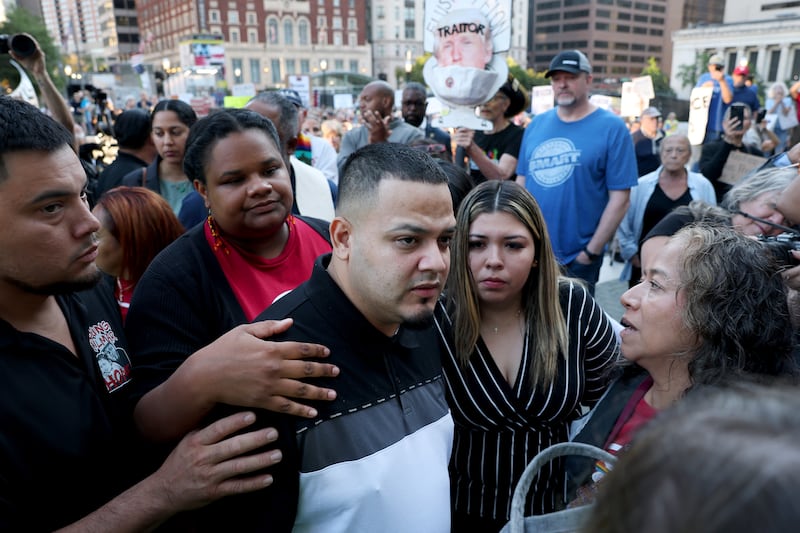A U.S. district judge blasted the Trump administration for its “cavalier acceptance” of the risk that a group of deported migrants will be tortured or killed.
U.S. officials appeared to have lavished a “widespread effort” on denying the migrants their due process rights, she said.
U.S. immigration judges had ruled that five plaintiffs in the case could not be deported to their home countries of Nigeria and Gambia because they were “more likely than not” to face persecution, torture, or death upon their return.
The plaintiffs, identified only by their initials for fear of persecution, were nevertheless deported to Ghana and are now being repatriated to their home countries.
In a scathing ruling, Judge Tanya S. Chutkan wrote that the court lacked jurisdiction to issue a temporary restraining order requiring U.S. officials to halt the repatriation, saying the court’s “hands are tied.”

But, she wrote, “The court does not reach this conclusion lightly. It is aware of the dire consequences plaintiffs face if they are repatriated. And it is alarmed and dismayed by the circumstances under which these removals are being carried out, especially in light of the government’s cavalier acceptance of plaintiffs’ ultimate transfer to countries where they face torture and persecution.”
The Daily Beast has reached out to the White House for comment.
The judges in the plaintiffs’ cases had issued final orders of removal, meaning the migrants could be deported, but had ruled that they should not be sent to their home countries because they were more likely than not to face persecution.
One man, identified as D.A. and married to a U.S. citizen, had been tortured by Nigeria’s military and police officers, and was told that if they ever saw him again, they would kill him, the court found.
The migrants were being held in U.S. Immigration and Customs Enforcement detention centers. On Sept. 5, they were woken up, shackled, and put on a U.S. military cargo plane without being allowed to notify their family or legal counsel.
Some of them were put in straitjackets for up to 16 hours, and at least one didn’t have any identification documents. On the plane, they learned they were being taken to Ghana, which was not designated as a potential removal country during their immigration proceedings.
They arrived in Dema Camp, a remote open-air detention facility surrounded by armed military guards, and were told they would be repatriated.
During emergency hearings, Trump administration officials told the court that the U.S. had reached “what appears to be a hasty and unwritten agreement with Ghana,” Chutkan wrote.
The U.S. government received a diplomatic note from Ghana promising that the plaintiffs would not be tortured or taken to a place where they would be tortured.

Ghana nevertheless “promptly” repatriated one of the plaintiffs, who has been forced to go into hiding, and announced plans to deport the others to their home countries, according to the ruling.
Lawyers for the government agreed that Ghana appeared to be violating the assurances it had given the U.S. government, but stated that the Trump administration couldn’t prevent the repatriation because the U.S. government “does not have the power to tell Ghana what to do.”
The case bears striking similarities to that of Kilmar Abrego Garcia, the Maryland dad who was mistakenly deported to the notorious CECOT prison in his home country of El Salvador despite a court order saying he couldn’t be repatriated, Chutkan noted in her ruling.
Despite Trump’s claims that they did not have the authority to order Abrego Garcia’s release from a foreign prison, the Supreme Court eventually ruled that the administration had to “facilitate” his return.
In that case, though, it was the original deportation that was improper. In this case, the parties agreed that the plaintiffs were properly sent to Ghana—it’s the removal to their home countries that is being contested, Chutkan wrote.

“This court cannot order the U.S. government to order a foreign government to take any action, despite facts in the record indicating that this agreement may have been designed to evade defendants’ obligations to plaintiffs,” she ruled.
Those obligations included providing due process and humane treatment for migrants, Chutkan wrote.
Given the similarities to the Abrego Garcia case and other deportations that have been challenged in court, the deportations appeared to “be part of a pattern and widespread effort to evade the government’s legal obligations by doing indirectly what it cannot do directly,” she added.
The post Federal Judge Rips Into Trump in Scathing Ruling: ‘Alarmed and Dismayed’ appeared first on The Daily Beast.




